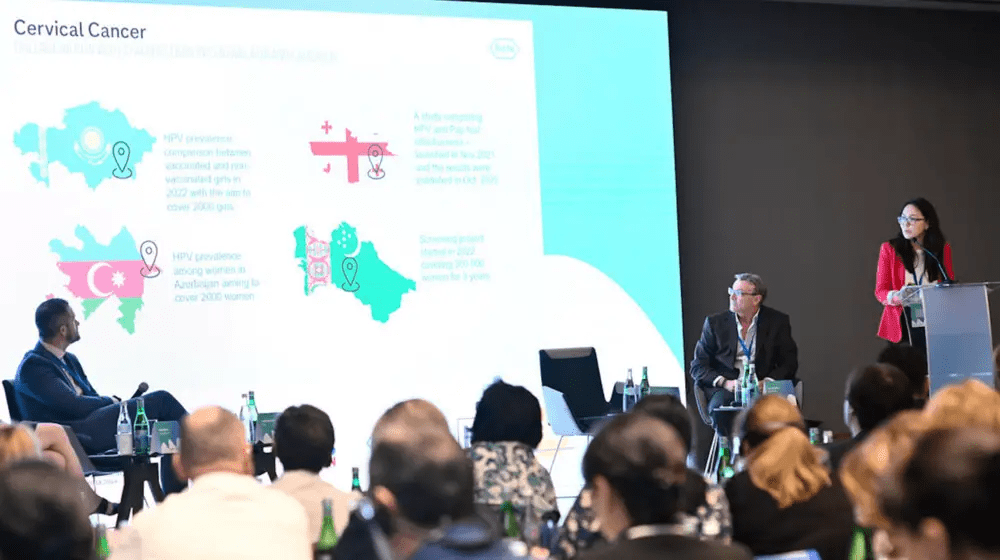The Annual Forum of the Regional Alliance for Cervical Cancer Prevention in Eastern Europe and Central Asia, held in Tbilisi on 28-29 September 2023 and co-hosted by United Nations Population Fund (UNFPA) succeeded in uniting key stakeholders, including the private sector, to discuss challenges and solutions to addressing cervical cancer as a public health issue.
One of the key sessions of this year's Forum was the Private Sector Round Table that featured influential voices from the pharmaceutical and medical technology firms and initiatives — Unitaid, MSD, Roche and MobileODT. The panellists deliberated on the role of the private sector in advancing access and affordability of cervical cancer supplies and technologies in the region.
“We at UNFPA see private companies as invaluable partners on the journey to eliminate cervical cancer,” said Dr Louise Dann, Resource and Partnerships Adviser at UNFPA’s Regional Office for Eastern Europe and Central Asia. “Their knowledge, resources, innovation, and commitment to expanding access are instrumental in driving progress, ensuring that together, we can save lives and alleviate the burden of this preventable disease.”
One of the critical points discussed during the session focused on the need to make cervical cancer products more affordable, thus ensuring broader accessibility. Smiljka de Lussigny, the lead for cervical cancer investments at Unitaid, a global health organization, delivered a presentation on the diversity in pricing for cervical cancer secondary prevention products globally and within the region. She also shared Unitaid's achievements in securing reductions and preferential pricing for these life-saving commodities to expand access. The participants underscored that despite the costs associated with cervical cancer prevention, this investment is more cost-effective than treating advanced stages of the disease.
Another vital takeaway from the session was the importance of complementing vaccination programmes with effective screening efforts. Mark Reiff, Director for Global Vaccines Policy Strategy and Partnerships at Merck Sharp & Dohme (MSD) — an human papillomavirus virus (HPV) vaccine manufacturer and key sponsor of the Annual Forum — emphasized the pivotal role of HPV vaccination in contributing to a future free of cervical cancer. He also highlighted MSD’s commitment to generating knowledge and shared the company’s research experience in HPV prevention — a key driver of cervical cancer incidence. Dr. Assel Sarsenbayeva, Medical Science Liaison at Roche — a major player in health care and another key sponsor of the Annual Forum — underlined the importance of early detection and the role it plays in saving lives and reducing the burden of cervical cancer in the region.
Innovation and technology played an instrumental role across different themes of the discussion, particularly concerning their potential to enhance access to cervical cancer health-care services for individuals residing in remote and rural areas. MobileODT, represented by Leon Boston, CEO, presented a vision of how new technologies can substantially reduce the time required for cervical cancer screening and diagnostics.
Aside from the Private Sector Round Table, the Annual Forum facilitated robust engagement of private sector representatives. A total of 20 delegates from nine different companies were present, with at least two companies specializing in each major cervical cancer product category, including vaccines, HPV assays, and colposcopes. All attending companies expressed their support for the Call to Action to Eliminate Cervical Cancer in Eastern Europe and Central Asia. This convergence of industry leaders signals a collective commitment to driving forward the fight against cervical cancer.
For further updates and information on the collaboration with private sector companies on cervical cancer prevention in Eastern Europe and Central Asia, please contact Dr Louise Dann at dann@unfpa.org.


